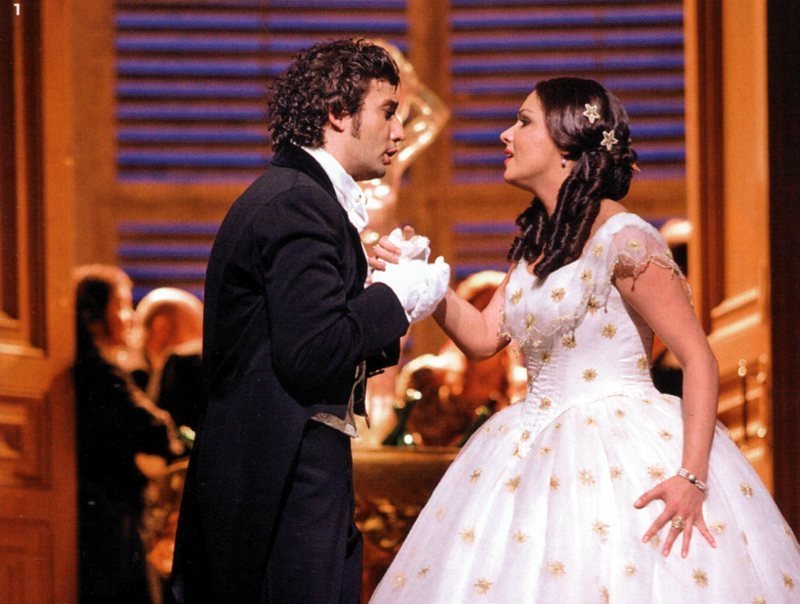|
|
|
|
|
|
|
|
| The opera critic |
| by Colin Anderson |
Verdi: La traviata, Royal Opera House, 14 January 2008
|
An altogether too healthy Violetta
|
|
|
 Richard Eyre's production of Verdi's La traviata
first opened at The Royal Opera in 1994 - and this current run is its tenth
revival. And it's not a short run, either, for there are two casts and
thirteen performances, the last being on February 14. Richard Eyre's production of Verdi's La traviata
first opened at The Royal Opera in 1994 - and this current run is its tenth
revival. And it's not a short run, either, for there are two casts and
thirteen performances, the last being on February 14.
Cast B, as it is called, includes Norah Amsellem (Violetta), Charles
Castronovo (Alfredo) and Mariusz Kwiecien (Germont) - the first night for
this change of crew is January 30. Constant to all the performances are most
of the singers taking the smaller roles as well as the maestro, Maurizio
Benini (actually Paul Wynne Griffiths conducts the very final performance).
And, with the familiar Prelude to Act I, it is Benini who has the
opportunity to set his seal immediately on proceedings and encapsulate the
whole. This happens up to a point; the strings of the Orchestra of the Royal
Opera House played well on this first night without suggesting that this
would be a revelation from the pit. Sensitive, yes, enough to suggest
'tragic serenity,' but while Benini is supportive of the singers, and
possibly too accommodating, the orchestral performance is rarely
illuminating while perfectly acceptable if just a little noisy at times. I
retain memory of telling clarinet solos and very suggestive pizzicatos -
what a master of economy Verdi was.
Peter Manning's violin solos touched the heart - rather more than Anna
Netrebko did as Violetta. Yes, she has a lovely voice and a bubbly
personality, but she rarely inhabited Violetta's sorrow, illness and
tragedy. She was, in short, too healthy - and although the vocalism became
increasingly impressive, Act I never really took off and needed greater
authority from the pit to bring things together. Netrebko's top notes
gleamed flawlessly and her lower notes were warmly chesty, yet when she
twirled around and had her back to the audience (such motions didn't always
seem necessary) this caused dynamic changes that were arbitrary. Whatever
the appeal of Netrebko is, she is not yet (here) a revealing actress and
bypasses much of Violetta's despair.
Jonas Kaufmann, as Alfredo, is more characterful, both in singing and
acting - and captures well Alfredo's initial concern for Violetta as well as
revealing his love for her; whether he is as desperate as someone would be
while gambling to restore fortune is another matter, although there is
genuine pity from him in Act III when Violetta (who is first of all viewed
reclined and lit by candlelight as the equally-familiar Prelude to that act
sets the gloomy scene) begins to face her demise. As Alfredo's father,
Giorgio Germont, Dmitri Hvorostovsky is outstanding - imposing and
patriarchal, and touching when fully realising Violetta's predicament.
The sets are splendid, whether conveying the opulence of Violetta's house,
the less palatial home that Violetta and Alfredo move to - one that is
starting to ruin, anyway - or the pallor of what will be Violetta's final
resting-place. The gambling-house is very snazzy and busy and if the crowd
scenes are a little wooden (in movement and gesture), there is much that is
'good' to look at. There were a few accidents on this first night - Kaufmann
knocked his hat off a table, Netrebko seemed to trip on her dress and a
chair fell over in the gambling scene - but what would have raised the
occasion was more-penetrating conducting, a Violetta that one felt real
sympathy for and, overall, musical tempos and character-relationships that
had well and truly arrived. |
|
|
|
|
|
|
|
|
|
|
|
|
|
|
|
|
|
|